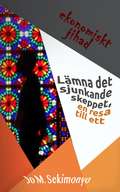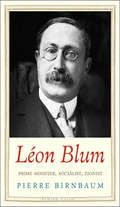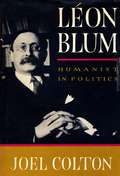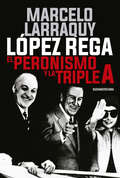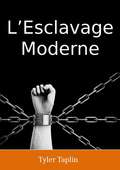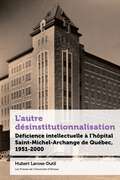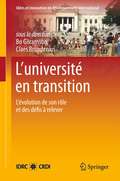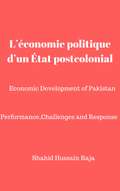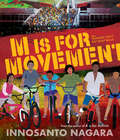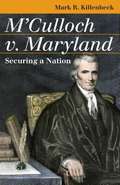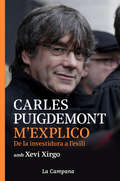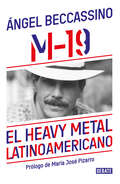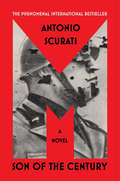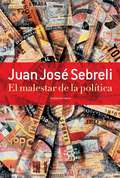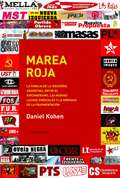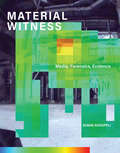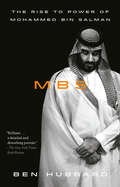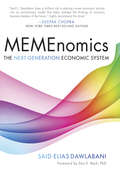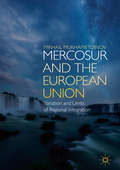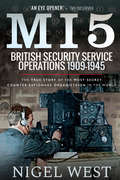- Table View
- List View
Lämna det sjunkande skeppet, en resa till ett ekonomiskt jihad
by Jo M. Sekimonyo Charlotta Zaar BöllFemtiofem nyanser av politisk ekonomi... Ekonomiska teoretiker har sedan starten för över 200 år sedan kämpat med frågan hur man fördelar rikedom, och dom har fortfarande inte kommit närmare en lösning. Författaren kritiserar inte bara kapitalismen, utan har äntligen lagt till ett nytt tankeväckande alternativ till det kannibalistiska systemet. Författarens okonventionella sätt att angripa problemen kommer att öka din hjärtfrekvens och göra dig illamående. I mitten av boken kan du finna dig själv famlande efter ett långt rep att hänga dig själv i, då du gett upp hoppet om mänskligheten... men gör inte det, för då missar du den spektakulära finalen. Denna bok är inte en ekonomisk liturgi. Författaren erbjuder ett tankeväckande botemedel mot global sociopolitisk ojämnlikhet; uppkomsten av ethosismen. Tara Casimir, Editor
Länderbericht zum Deutschen Freiwilligensurvey 2019 (Bürgergesellschaft und Demokratie)
by Everhard Holtmann Tobias Jaeck Odette WohllebenDieses Open-Access-Buch bringt die Daten des Deutschen Freiwilligensurveys 2019 für einen Vergleich der Bundesländer Baden-Württemberg, Bayern, Berlin, Brandenburg, Hamburg, Hessen, Mecklenburg-Vorpommern, Niedersachsen, Nordrhein-Westfalen, Rheinland-Pfalz, Saarland, Sachsen, Sachsen-Anhalt, Schleswig-Holstein und Thüringen zusammen. Der Freiwilligensurvey wurde 2019 zum fünften Mal im Auftrag des Bundesministeriums für Familie, Senioren, Frauen und Jugend (BMFSFJ) durchgeführt. Die Ziele der vorliegenden Auswertung sind eine aktuelle Bestandsaufnahme des freiwilligen Engagements und weiterer Formen zivilgesellschaftlichen Handelns in den einzelnen Bundesländern sowie eine Darstellung zentraler Entwicklungen im Zeitverlauf seit 1999. Des Weiteren wurden erstmals landesspezifische Charakteristika und die individuellen Kontexte und Umfeldbedingungen von freiwilligen Engagement analysiert.
Léon Blum
by Pierre BirnbaumLéon Blum (1872–1950) was many things: a socialist and political activist, leader of the Popular Front; a dedicated statesman who served as France's prime minister three times; a hero who courageously opposed anti-Semitism, Nazi aggression, and the pro-German Vichy government; a passionate lover of women, art, and life. A tireless champion for workers’ rights, Blum dramatically changed French society by establishing the forty-hour work week, paid holidays, and collective bargaining on wage claims. He was also a proud Jew and Zionist, and a survivor who endured the horrors of Buchenwald and Dachau. Unlike previous biographies that downplay the significance of Blum’s Jewish heritage on his progressive politics, Pierre Birnbaum’s portrait depicts an extraordinary man whose political convictions were shaped and driven by his religious and cultural background. The author powerfully demonstrates how Blum’s Jewishness was central to his milieu and mission from his earliest entry into the political arena in reaction to the Dreyfus Affair, and how it sustained and motivated him throughout the remainder of his life. Birnbaum’s Léon Blum is a critical chapter in the larger history of Jews in France.
Léon Blum: Humanist in Politics
by Joel ColtonJohn Colton is a meticulous researcher and a fine craftsman. In his political biography of Leon Blum, these two qualities are beautiully blended; none of the available evidence appears to have been over looked, and the enormous mass of variegated material has been transmuted in a polished, richly tapestried, and absorbing narrative.
Límites Socioculturales de la Educación Ambiental (Acercamiento desde la experiencia cubana)
by Carlos Jesús Delgado DíazEs evidente que el progreso científico-tecnológico, el bienestar de las sociedades industrializadas y el deterioro del medio ambiente se encuentran profundamente relacionadas. Al minarse las bases de los ciudadanos, la preocupación social por lo ambiental se ha manifestado como una institución social de ese vínculo con la naturaleza demandando una nueva educación que incluya la reflexión y modificación de su relación material con el mundo.
López Rega: El peronismo y la Triple A
by Marcelo LarraquyVida de José López Rega, un anónimo policía retirado al servicio del matrimonio de Juan Domingo Perón e Isabel Martínez, que terminó influyendo en el destino de la Argentina en los años setenta, con la gestación de la organización paraestatal Triple A durante el tercer gobierno peronista. Más de dos mil muertos, en crímenes todavía impunes, fueron el antecedente del terrorismo de Estado de la dictadura militar que usurpó el poder en 1976. Este libro puede leerse como la clásica biografía de un personaje oscuro, menor, al que los acontecimientos históricos le dieron dimensión política. José López Rega empieza a gravitar en la vida de los argentinos en 1966, cuando ingresa al servicio doméstico del matrimonio de Juan Perón e Isabel Martínez; por eso, a la vez, es una historia íntima de Perón. En esta notable investigación, Marcelo Larraquy profundiza además en las circunstancias que originaron la violencia durante el tercer gobierno peronista (1973-1976), de la cual la Triple A comandada por "el Brujo" fue brazo ejecutor, y que fue el preludio de la feroz represión desplegada por la dictadura. Este intenso trabajo de reelaboración actualiza una obra necesaria para comprender no sólo qué se discute hoy sobre los años setenta, sino también la naturaleza de las disputas en el interior del aparato justicialista.
L’Esclavage Moderne
by Ruth-Ellen Alcendor Tyler TaplinUne étude intrigante sur l'esclavage dans la société actuelle Vous croyez que l'esclavage fait partie du passé : ce livre vous montrera clairement qu'il existe bel et bien de nos jours. Il vous informera sur les différentes formes d'esclavage pratiquées dans la société de nos jours, tout en vous expliquant comment les gens se retrouvent dans des conditions d'esclavage. Le trafic humain se produit sous vos yeux, mais il est difficile à déceler. Vous apprendrez donc comment le trafic humain se déroule et comprendrez pourquoi il passe complètement inaperçu.
L’autre désinstitutionnalisation: Déficience intellectuelle à l’Hôpital Saint-Michel-Archange de Québec, 1951-2000 (21e – Société, histoire et cultures)
by M Hubert Larose-DutilL’autre désinstitutionnalisation explore l’histoire de la désinstitutionnalisation de la déficience intellectuelle au Québec. Depuis les années 1960, ce vaste mouvement de réforme a chamboulé l’organisation des services psychiatriques. Les longues périodes d’hospitalisation, vivement critiquées, devaient prendre fin. Désormais, l’institution ne serait plus un milieu de vie, mais bien seulement un lieu de traitement. Alors que la réforme bat son plein, les patientes et patients ayant un diagnostic de déficience intellectuelle tardent à quitter l’hôpital. D’année en année, ils représentent une part de plus en plus grande de la population institutionnalisée. À l’Hôpital Saint-Michel-Archange de Beauport, en banlieue de Québec, 19 % des patients et patientes avaient un diagnostic de déficience intellectuelle en 1970 contre 15 % en 1960.Comment furent vécues ces années de réforme par cette population dont la réintégration se fit attendre ? L’autre désinstitutionnalisation répond à cette question en plongeant dans les dossiers médicaux de quatorze patientes et patients de l’Hôpital Saint-Michel-Archange. C’est par les traces que laissèrent dans les archives de cet établissement Claude, Gaston, André, Bernard, Juliette, Monique, Denise, Raymond, Marie, Serge, Fernand, Réal, Marguerite et Pierre que cet ouvrage entend contribuer à une histoire par le bas de la déficience intellectuelle.
L’université en transition
by Bo Göransson Claes BrundeniusLa mondialisation, l'ère de l'information et l'essor de l'économie du savoir transforment profondément les modalités d'acquisition, de diffusion et de transformation du savoir. Il s'ensuit que la production du savoir a graduellement davantage à voir avec la compétitivité économique et y est plus directement liée. Ce nouvel état de fait signifie également que les universités se sentent de plus en plus poussées à s'adapter aux besoins de la société et de l'économie, qui évoluent sans cesse. En particulier, des pressions croissantes s'exercent sur les établissements d'enseignement supérieur et de recherche des pays industrialisés pour qu'ils définissent et affirment leur nouveau rôle au sein du système national d'innovation. Les établissements des pays en développement, quant à eux, sont appelés à définir le rôle qu'ils joueront afin de soutenir les structures émergentes du système d'innovation. Ce livre examine le rôle des universités et des instituts de recherche nationaux dans le développement économique et social. En réunissant des textes rendant compte d'initiatives et d'innovations dans diverses régions du monde, notamment en Chine, en Europe de l'Est, en Amérique latine, en Scandinavie, en Asie du Sud-Est, en Afrique subsaharienne et en Europe de l'Ouest, l'ouvrage brosse un tableau qui est d'actualité et qui intéressera tant les responsables des politiques et les administrateurs d'universités que les leaders économiques et sociaux et les chercheurs. Bo Göransson et Claes Brundenius sont tous deux affiliés au Research Policy Institute de l'Université de Lund, en Suède. M. Göransson est professeur agrégé et coordonnateur du programme LEAP4D, et M. Brundenius est professeur honoraire.
L’économie politique d’un État postcolonial
by Shahid Hussain RajaL’économie politique d’un État postcolonial: L’histoire du développement économique du Pakistan par Shahid Hussain Raja Comment l’histoire coloniale en interaction avec les politiques économiques néocoloniales influence le contenu et le cours du développement des états postcoloniaux. Le Pakistan était un état sous-développé typique quand il a amorcé son voyage en tant qu'État-nation indépendant le 14 août 1947, confronté à une myriade de défis allant de la menace à son existence même à la révolution des attentes croissantes des masses d’une part et l’accès au statut d’état indépendant, confiant et prospère dans le concert des nations de l'autre. En faisant face à ces défis avec audace, le nouvel État commençait son voyage littéralement à partir de rien. Du statut de l’un des pays les moins développés du monde à son accession à l’indépendance, l'économie pakistanaise a connu une croissance assez impressionnante de 6% par an au cours des quatre premières décennies son existence en tant que nation. Malgré les hauts et les bas, le Pakistan est désormais la 26ème plus grande économie du monde en termes de parité de pouvoir d'achat (44ème en termes de PIB nominal). Avec un revenu par habitant de 4550 $ US, le Pakistan occupe la 140e place à ce chapitre dans le monde, grâce à sa population croissante de 200 millions de personnes. Le Pakistan fait partie des ‘Next Eleven’, les onze pays qui, avec les BRICs, ont le potentiel de devenir l'une des grandes économies du monde au cours du 21ème siècle. Selon Goldman Sachs, en 2050 avec un PIB estimé à 3,33 milliards de dollars, le Pakistan devrait devenir la 18ème plus grande économie mondiale.
M is for Movement
by Innosanto NagaraHere is the story of a child born at the dawn of a social movement.At first the protests were in small villages and at universities. But then they spread. People drew sustenance from other social movements in other countries. And then the unthinkable happened.The protagonist in this fictionalized children's memoir is a witness and a participant, fearful sometimes, brave sometimes too, and when things change, this child who is now an adult is as surprised as anyone.
M'Culloch v. Maryland: Securing a Nation (Landmark Law Cases & American Society Series)
by Mark R. KillenbeckFederalism--including its meanings and limits--remains one of the most contested principles in constitutional law. To fully understand its importance, we must turn to a landmark decision nearly two centuries old. M'Culloch v. Maryland (1819) is widely regarded as the Supreme Court's most important and influential decision-one that essentially defined the nature and scope of federal authority and its relationship to the states. Mark Killenbeck's sharply insightful study helps us understand why. Killenbeck recounts how the cashier of the Baltimore branch of the Second Bank of the United States refused to pay Maryland's tax on the bank and how that act precipitated a showdown in the Supreme Court, which addressed two questions: whether the U.S. Congress had the authority to establish a national bank and whether Maryland's tax on the bank was barred by the Constitution. In one of Chief Justice John Marshall's most famous opinions, the Court unanimously answered yes to both, authorizing the federal government to exercise powers not expressly articulated in the Constitution--and setting an alarming precedent for states--rights advocates.
M'explico: De la investidura a l'exili
by Carles Puigdemont Xevi Xirgo«No és un relat blanc, ni conformista, ni mancat d'autocrítica. És un relat fet a paraula viva, com una narració quasi en directe.» CARLES PUIGDEMONT El més senzill i còmode hauria estat no fer aquest llibre. Durant força temps he sospesat l'oportunitat de desar-lo en un calaix la clau del qual la tinguessin generacions futures. Si n'he resolt la publicació és perquè he cregut que el seu contingut podria ser útil no només per entendre millor el passat i el present sinó, molt especialment, per preparar-nos pel futur. Que sigui útil i positiu no vol dir, tanmateix, que estigui lliure d'algunes agrors que tots hauríem volgut estalviar-nos: no és un relat blanc, ni conformista, ni mancat d'autocrítica. Es un relat fet a paraula viva, com una narració quasi en directe. Finalment, aquestes pàgines que llegireu -si teniu la bondat de fer-ho- demanen una mica d'indulgència i generositat, perquèmalgrat l'honestedat i el sacrifici inqüestionable de tots plegats, en alguns dels passatges d'aquesta història no quedem bé. Jo tampoc, és clar. La continuació, aviat a les llibreries: La lluita a l'exili.
M-19 El heavy metal latinoamericano
by Ángel Beccassino"Volver a publicar estos diálogos es una contribución a esta nueva oportunidad que en estos últimos años se ha abierto en Colombia para dejar las armas atrás. Y es un aporte a la reflexión de quienes sienten que desde entonces muy poco ha cambiado en el país, salvo cuantitativamente, ya que mucho de lo que veíamos en aquellos días hoy se ha agravado". Ángel Beccasino A finales de 1988, el periodista y fotógrafo Ángel Beccassino se internó con varios integrantes del M-19 y de las FARC en un lugar controlado por este grupo guerrillero. Durante un mes, Carlos Pizarro Leongómez, entonces comandante del M-19, intentó convencer al secretariado de las FARC de sumarse a un proceso de paz. El autor convivió allí con sus entrevistados y pudo obtener largas horas de conversaciones con Pizarro, Manuel Marulanda, Jacobo Arenas y Afranio Parra, entre otros. Más adelante continuó las entrevistas con el líder del M-19 y con otros miembros de este grupo como Antonio Navarro Wolff, Vera Grabe y Otty Patiño, en medio de los diálogos para desmovilizarse desde el campamento del movimiento guerrillero en Santodomingo, Cauca. Ahora, más de tres décadas después del magnicidio de Pizarro y de la primera edición de este libro, y ante el triunfo de Gustavo Petro en las pasadas elecciones a la presidencia de Colombia, cobran relevancia estas entrevistas, en especial las concedidas por el famoso comandante del M-19, pues recogen su visión de país y las ideas que inspiraron al movimiento, tanto en su creación, como en su proceso de desmovilización.
M25: A Circular Tour of the London Orbital
by Ray HamiltonHave you ever wanted to know…Which junction to take for Gibraltar?How to save £35,040 a year on Dartford Crossing tolls?How many assassins were buried within the concrete of the M25? (at least one)Why it’s important that North Ockendon declares itself independent from Greater London at the earliest opportunity?This indispensable biography of a road profiles the 117 miles of Britain’s most infamous motorway, from its controversial origins to its present-day status as backdrop to the lives and commutes of millions. Told with Ray Hamilton’s trademark powers of observation and off-the-wall humour, it is an eye-opening account of the stuff you didn’t know about the M25 – including the action, sightseeing or nature-loving fun you can have coming off at any junction – and a very different view of the stuff you did know.
M25: A Circular Tour of the London Orbital
by Ray HamiltonHave you ever wanted to know…Which junction to take for Gibraltar?How to save £35,040 a year on Dartford Crossing tolls?How many assassins were buried within the concrete of the M25? (at least one)Why it’s important that North Ockendon declares itself independent from Greater London at the earliest opportunity?This indispensable biography of a road profiles the 117 miles of Britain’s most infamous motorway, from its controversial origins to its present-day status as backdrop to the lives and commutes of millions. Told with Ray Hamilton’s trademark powers of observation and off-the-wall humour, it is an eye-opening account of the stuff you didn’t know about the M25 – including the action, sightseeing or nature-loving fun you can have coming off at any junction – and a very different view of the stuff you did know.
M: A Novel
by Antonio ScuratiThe massive international bestseller—an epic historical novel that chronicles the birth and rise of fascism in Italy, witnessed through the eyes of its founder, the terrifyingly charismatic figure who would become one of the most notorious dictators of the twentieth century, Benito Mussolini.It is 1919, and the Great War that has ravaged Europe is over. In Italy, the people are exhausted. Tired of the political class. Tired of vague promises, inept moderates, and the agonizing machinations of a democracy that has failed ordinary citizens.While elite leaders have sat idly by, achieving nothing, one outsider—the director of a small opposition newspaper and a tireless political agitator—is electrifying the masses, promising hope for a demoralized nation hungry for change.A former socialist leader ousted by his own party, he is a drifter who knows what it is to feel lost. His voice speaks for the misfits and the outcasts; he is a protector of those who are forgotten. He is Benito Mussolini. And soon Italy—and the world—will be forever remade. In M: Son of the Century, Antonio Scurati tells the story of fascism from within the mind of its founder, the man known to his followers as Il Duce. Steeped in historical detail and interspersed with period documents and sources, this masterful saga explores the seductive power of nationalism and idolatry, revealing how authoritarianism took hold and a nation bent to the will of one ruthless strongman. Provocative and resonant, M is a chilling reminder that the past is never gone, and that it holds urgent lessons for us today.
MALESTAR DE LA POLITICA, EL (EBOOK)
by Juan Jose Sebreli#El lenguaje de la política #en contra de sus propias intenciones# suele ser impreciso y ambiguo, de ahí el riesgo de su transformación, por pereza mental o por motivos utilitarios, en etiquetas o fórmulas estereotipadas, en eslóganes publicitarios o simples estribillos que no dicen nada.# Así comienza Juan José Sebreli este libro, que por un lado se inscribe en una tradición de entomología maldita encarnada por el autor, haciendo foco en esos males que de tan naturalizados ya no parecen males, y por otro resulta una análisis de una rabiosa modernidad. Mirar hacia atrás para poder mirar hacia adelante, eso hace, una vez más, Sebreli, para detectar el modo en el que el lenguaje político se aleja de la política, se aleja de las ideas y de los argumentos, para atrincherarse en la vulgaridad y/o la demagogia o en una jerga académica completamente hueca. El malestar de la política logra trazar un nuevo diccionario ideológico (lo que equivale a decir que recalibra la idea misma de #política#), una nueva normativa, a la vez que nos recuerda que el diálogo, la discusión y la controversia son insustituibles en la persistencia de la vida democrática.
MAREA ROJA (EBOOK)
by Daniel KohenQué lugar ha ocupado la izquierda argentina en la coyuntura socio- política de la última década? Cada vez que estalla un conflicto social en nuestro país, en el centro de la escena se puede distinguir a la izquierda argentina que oscila entre las tapas de los principales diarios y el más puro ostracismo. Conflictos como el lock-out de las entidades del campo, las peleas gremiales en el subterráneo de la ciudad de Buenos Aires, las elecciones en la UBA, la crisis del 2001, la política de derechos humanos durante la administración K y el conflicto en la ex Terrabusi, sólo por nombrar algunos de los hechos en los cuales la izquierda tuvo un lugar protagónico. Pero cuál es su verdadero rol y su influencia? Daniel Kohen analiza e interpreta la ideología, los modos y el accionar de este actor político en los últimos diez convulsionados años de la Argentina, a la vez que propone un estudio de las características y los modos de operar de los más de cuarenta partidos y grupos que conforman lo que el autor llama la #familia leninista#. Con una exhaustiva investigación de fondo y un excelente modo de narrar, Marea roja analiza qué es hoy la izquierda y echa luz sobre los rasgos que la unifican y la fragmentan, y sobre las rememoraciones que componen su santoral.
MATERIAL WITNESS: Media, Forensics, Evidence (Leonardo)
by Susan SchuppliThe evidential role of matter—when media records trace evidence of violence—explored through a series of cases drawn from Kosovo, Japan, Vietnam, and elsewhere.In this book, Susan Schuppli introduces a new operative concept: material witness, an exploration of the evidential role of matter as both registering external events and exposing the practices and procedures that enable matter to bear witness. Organized in the format of a trial, Material Witness moves through a series of cases that provide insight into the ways in which materials become contested agents of dispute around which stake holders gather.These cases include an extraordinary videotape documenting the massacre at Izbica, Kosovo, used as war crimes evidence against Slobodan Milošević; the telephonic transmission of an iconic photograph of a South Vietnamese girl fleeing an accidental napalm attack; radioactive contamination discovered in Canada's coastal waters five years after the accident at Fukushima Daiichi; and the ecological media or “disaster film” produced by the Deep Water Horizon oil spill in the Gulf of Mexico. Each highlights the degree to which a rearrangement of matter exposes the contingency of witnessing, raising questions about what can be known in relationship to that which is seen or sensed, about who or what is able to bestow meaning onto things, and about whose stories will be heeded or dismissed.An artist-researcher, Schuppli offers an analysis that merges her creative sensibility with a forensic imagination rich in technical detail. Her goal is to relink the material world and its affordances with the aesthetic, the juridical, and the political.
MBS: The Rise to Power of Mohammed bin Salman
by Ben HubbardA gripping, behind-the-scenes portrait of the rise of Saudi Arabia&’s secretive and mercurial new ruler. <P><P>MBS is the untold story of how a mysterious young prince emerged from Saudi Arabia’s sprawling royal family to overhaul the economy and society of the richest country in the Middle East—and gather as much power as possible into his own hands. <P><P>Since his father, King Salman, ascended to the throne in 2015, Mohammed bin Salman has leveraged his influence to restructure the kingdom’s economy, loosen its strict Islamic social codes, and confront its enemies around the region, especially Iran. That vision won him fans at home and on Wall Street, in Silicon Valley, in Hollywood, and at the White House, where President Trump embraced the prince as a key player in his own vision for the Middle East. <P><P>But over time, the sheen of the visionary young reformer has become tarnished, leaving many struggling to determine whether MBS is in fact a rising dictator whose inexperience and rash decisions are destabilizing the world’s most volatile region. Based on years of reporting and hundreds of interviews, MBS reveals the machinations behind the kingdom’s catastrophic military intervention in Yemen, the bizarre detention of princes and businessmen in the Riyadh Ritz-Carlton, and the shifting Saudi relationships with Israel and the United States. <P><P>And finally, it sheds new light on the greatest scandal of the young autocrat’s rise: the brutal killing of journalist Jamal Khashoggi by Saudi agents in Istanbul, a crime that shook Saudi Arabia’s relationship with Washington and left the world wondering whether MBS could get away with murder. MBS is a riveting, eye-opening account of how the young prince has wielded vast powers to reshape his kingdom and the world around him.
MEMEnomics
by Said Elias DawlabaniMEMEnomics -- \MEE - MEH -nomics\ -nounA new branch of social science that studies patterns of economic policies and practices by taking an integral, whole-systems approach to economic sustainability. The term "vMEME" (the superscript "v" is for "value") refers to a core value system expressed through a culture's memes, i. e. , its ideas, habits, and cultural preferences and practices that spread from person to person. In MEMEnomics Said E. Dawlabani reframes our economic history and the future of capitalism through the unique prism of a culture's value systems. Focusing on the long-term effects of economic policies on society, he expands psychologist Clare W. Graves' concepts of the hierarchical nature of human development and the theories of value systems of Beck and Cowan's Spiral Dynamics. He presents our economic history in terms of the hierarchy of five of the eight value-systems or vMEMEs of human existence that we can now identify. These new value preferences emerge as people interact with their environment to solve the problems of their "life conditions. " The author believes that the pattern of economic cycles resulting from cultural value systems is critical to understanding the evolution of the meme of laissez-faire capitalism. By demonstrating predictable cycles of our economic history through the spiral of evolving levels of cultural value systems, he argues for the need to change the course of failures inherent in our current system. Mr. Dawlabani then offers a solution to the viability of capitalism-the formation of a "smart model" of government designed from the values of the currently emerging seventh-level value system. Mr. Dawlabani calls on business leaders to evolve their values to the higher seventh-level system detailed in his "platform of functional capitalism. " In this evolution of business consciousness, humanity moves from the myopic ethic of "subsistence" to a new frontier that champions the emerging ethic of the "magnificence of existence"-where we will all blend as part of a larger, compassionate whole.
MERCOSUR and the European Union: Variation And Limits Of Regional Integration
by Mikhail MukhametdinovThe book draws comparison between MERCOSUR and the European Union to explain variation of regionalism and to expose its limits. The project is based on the idea that contemporary examples of regionalism should be evaluated against several propositions of multiple integration theories rather than against a single theory. In order to systematically explain why and how integration outcomes in MERCOSUR differ from those in the EU, the author develops an analytical framework for the comparison of the two blocs. MERCOSUR is compared with the EU by the use of the various criteria of economic interdependence, economic convergence, intra-bloc size and interest asymmetries, cultural diversity and geostrategic motivations, which are identified as the salient parameters of integration theories.
MH/CHAOS
by Frank J. RafalkoOperation MH/CHAOS was the code name for a domestic espionage project conducted by the Central Intelligence Agency in the late1960s and early 1970s. MH/CHAOS: The CIA's Campaign Against the Radical New Left and the Black Panters is an insider's account of the CIA's Counterintelligence Staff's Special Operations Group first charged by Presidents Lyndon Johnson and later by Richard Nixon to find foreign intelligence, terrorist, organizations or government contacts, controlling or influencing Anti-Vietnam War activists or American black extremists protesting, bombing and carrying out other anti-government, unlawful or illegal activities in the United States. The operation was launched under Director of Central Intelligence Richard Helms, by chief of counter-intelligence, James Jesus Angleton, and headed by Richard Ober. The program's goal was to unmask possible foreign influences on the student antiwar movement. The "MH" designation signified that the program had a worldwide area of operations. When President Nixon came to office in 1969, all of the existing domestic surveillance activities were consolidated into Operation MH/CHAOS and used CIA stations abroad to report on antiwar activities of United States citizens traveling abroad, employing methods such as physical surveillance and electronic eavesdropping, utilizing "liaison services" in maintaining such surveillance. The operations were later expanded to include 60 officers. In 1969, following the expansion, the operation began developing its own network of informants for the purposes of infiltrating various foreign antiwar groups located in foreign countries that might have ties to domestic groups. Eventually, CIA officers expanded the program to include other leftist or counter-cultural groups with no discernible connection to Vietnam, such as groups operating within the women's liberation movement, including Students for a Democratic Society, the Black Panther Party and Women Strike for Peace. Also targeted was the Israeli embassy, and domestic Jewish groups such as the B'nai B'ritht. As a result of the Watergate break-in, involving two former CIA officers, Operation MH/CHAOS was discontinued. The secret nature of the program was exposed by Seymour Hersh in the New York Times on December 22, 1974. The following year, further details were revealed during Representative Bella Abzug's House Subcommittee on Government Information and individual Rights. The government, in response to the revelations, launched the Commission on CIA Activities Within the United States (The Rockefeller Commission), lead by then Vice President Nelson Rockefeller, to investigate the depth of the surveillance. In MH/CHOAS, the author, who is a former CIA officer, refutes the charges made by the New York Times and the Washington Post at the time that this domestic spying program first made headlines, and takes issue with conclusions of the Rockefeller Commission and the Church Committee. He relates how the Special Operations Group began, was staffed and how it was transformed into an anti-terrorist unit before it ceased operation. Rafalko details the information that Special Operations Group collected against the New Left and Black extremists and makes the case that the MHCHAOS program was justified, why the CIA was the logical agency to conduct the collection, and the consequences suffered later by American counterintelligence because of these investigations.
MI5: The True Story of the Most Secret counter-espionage Organisation in the World
by Nigel WestThe author of The Kompromat Conspiracy shares the history of MI5, from its beginnings in 1909 to 1945 and its role in the Second World War. MI5 is arguably the most secret and misunderstood of all the British government departments. Its enigmatic title—much more than its proper name, the Security Service—stands in the public mind for the dark world of the secret services. In reality it has a very specific responsibility: counterintelligence. Its purpose is to combat espionage and subversion directed against the UK. Nigel West&’s book traces the history of MI5 from its modest beginnings in 1909 until 1945, focusing on the important role it played in World War II. This includes the story of the sixteen enemy agents rounded up in Britain who were either hanged or shot; the manipulation of the Axis espionage networks by the use of &“turned&” Abwehr agents (the famous Double Cross System) and the all-important check on its success provided by the intercepted German signals decoded at Bletchley; and the various deceptions practiced on the German High Command. Laced with true anecdotes as bizarre and compulsively readable as any John Le Carré novel, this book is the fruit of years of painstaking research. West has traced and interviewed more than a hundred people who figure prominently in the story: German and Soviet agents, counterintelligence officers, and even more than a dozen double agents. In this newly revised edition, Nigel West details the organizational charts which show the structure of the wartime security apparatus, in the most accurate and informative account ever written of MI5 before and during the Second World War.
